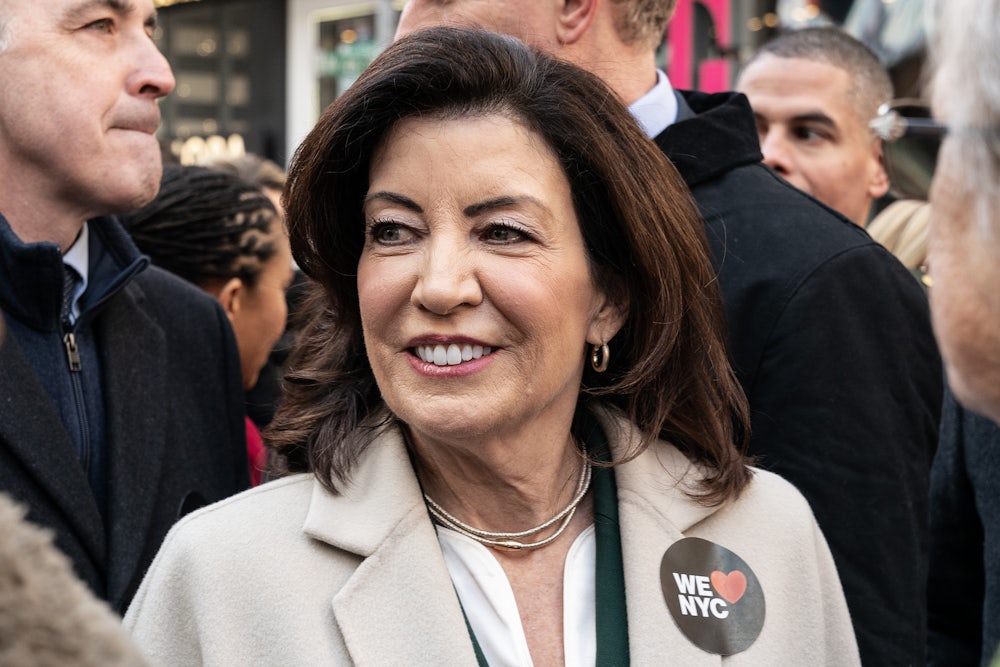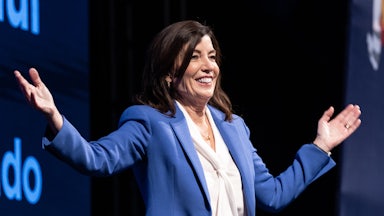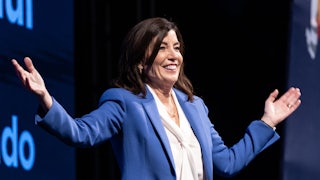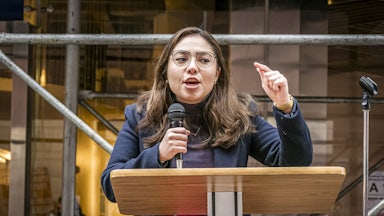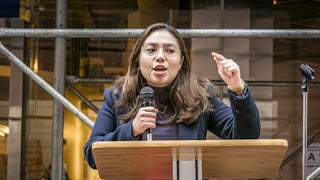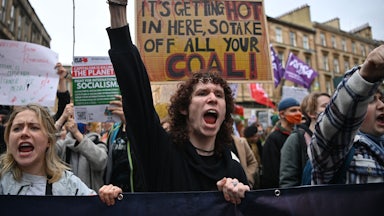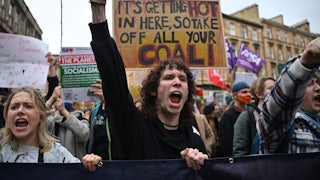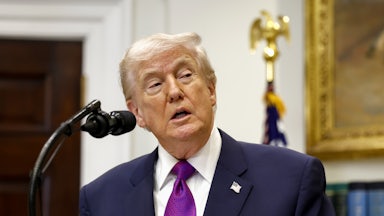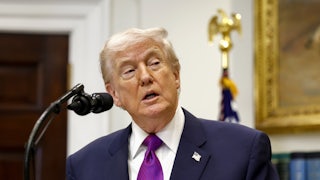While all eyes were on former President Donald Trump’s arraignment in Manhattan this week, there was a different sort of circus playing out upstate, as the state of New York blew past its April 1 deadline to agree on a budget. While progressives and Governor Kathy Hochul have publicly sparred over issues like bail reform, climate had emerged in recent months as one area where there might be more common ground. Hochul’s office seemed open to passing legislation that would implement the climate bill the state passed in 2019, the Climate Leadership and Community Protection Act; despite its Democratic supermajority, Albany has yet to approve a bill to meaningfully follow through on CLCPA’s goal of reducing emissions by 40 percent below 1990 levels by 2030, and 85 percent by 2050.
But old habits die hard. On Monday, Senate Energy Committee Chairman Kevin Parker introduced a bill that included a measure pushed by the governor’s office to change the way New York counts emissions from methane, a greenhouse gas that traps 80 times as much heat as carbon dioxide for 20 years. Parker’s bill would have the state measure the impact of emissions over 100 years rather than 20. That would drastically reduce the amount the state would need (on paper) to reduce its emissions to comply with the CLCPA, New York Focus reported. The state’s fossil fuel interests—notably including gas utilities who would benefit from the change—were supportive, unsurprisingly; critics suspect they were behind the eleventh-hour push to introduce it into budget talks, with Hochul’s apparent blessing.
“Until last week her strongest suit was climate. That’s one of the reasons why this has been so deeply disappointing,” said Assemblymember Emily Gallagher, a co-sponsor of the All-Electric Buildings Act. Green groups promptly accused Hochul of wanting to “gut” the CLCPA on behalf of her fossil fuel donors. Climate scientists criticized the proposal too. Amid a barrage of negative pressure, the administration withdrew its support on Wednesday, but the energy committee chairs are reportedly still defending the change. Having avoided a last-minute crisis, climate groups and allied legislators will continue trying to extract support for including more muscular and justice-oriented emissions-reduction policies in the budget.
With Republicans back in control of the House of Representatives, blue states like New York have been positioned as torchbearers for climate action while federal action stalls. But battles like the one this week show just how hard that will be—even in places where there’s a consensus that something needs to be done about climate change.
New York should theoretically be a haven for progressive policy. Armed with strong Democratic majorities in the Senate and Assembly, though, Hochul has made a series of baffling choices. Most notable on that front was when she tapped an anti-choice former prosecutor, Hector LaSalle, to serve as the state’s chief judge late last year; the nomination was torpedoed in the legislature following a heated pressure campaign from progressives. Voters had just mobilized to defend abortion rights after the Supreme Court moved to overturn Roe v. Wade last summer; midterms exit polling found that 60 percent of voters were dissatisfied with the decision.
Hochul’s climate decisions have been similarly alienating to the Democratic left. As The Lever pointed out, she’s received generous campaign donations from the state’s fossil fuel interests, which, in addition to backing the change to the state’s methane accounting, have gone on offense against electrification efforts. Last year she received $480,000 in donations from utility and fossil fuel executives and lobbyists that could benefit from the rule change. Political action committees for National Grid—a gas utility—donated a combined $13,500 to Hochul, on top of $1,000 from its CEO. The head of the gas and electric utility Consolidated Edison put $10,000 toward her campaign.
“There’s a track record of her accepting fossil fuel money,” said Lizzy Oh, coordinator of Public Power NY, a coalition that has pushed for the Build Public Renewables Act and, this week, against the methane rule change. “There is also a slew of climate legislation that would be slam dunks for her and her administration that she’s just not getting behind.”
One of the principles being illustrated in Albany these days is that, while Democrats are certainly more amenable to climate policy than Republicans, letting corporate polluters dictate the terms of said policy is a thoroughly bipartisan enterprise. That’s partly due to old-fashioned horse trading: Those tracking the negotiations reasoned that new methane accounting was the pound of flesh gas interests especially wanted to extract in exchange for their acquiescence to other climate measures, including the “cap-and-invest” program Hochul seems committed to passing.
Others in Hochul’s administration seem similarly cozy with industry—or at least have been handed their talking points. On the news program Capital Tonight, less than 24 hours before the about-face, Department of Environmental Conservation Commissioner Basil Seggos and New York State Energy and Research Development Authority President and CEO Doreen Harris parroted language from an industry front group, New Yorkers for Affordable Energy, which has fearmongered about climate measures raising costs and threatening reliability. While (briefly) backing the change in methane accounting on television, Seggos and Harris explained that the administration was simply looking to protect New Yorkers from “potentially extraordinary costs” imposed by the current 20-year accounting framework.
The status of New York’s budget and its climate policy remain unclear. Climate advocates are hopeful that measures to electrify buildings and build public renewables (among others) can make it through this session, though there are still few details as to what will be included in the budget lawmakers are slated to agree on sometime later this month. The Build Public Renewables Act, which would be a huge triumph for progressives if it’s instituted, has already failed in New York twice, including last year.
Whatever happens in the coming weeks and months, New York’s experience already offers some uneasy lessons to a national audience. The Empire State’s muscular climate movement—which got former Governor Andrew Cuomo to ban fracking in 2014—fought for years to get a climate bill on the books. That passed only after progressives worked to oust more conservative fellow Democrats, who caucused with Republicans and handed them a de facto majority despite the state’s blue electorate. The CLCPA’s passage then ushered in a still unresolved battle over how to implement it.
As Build Back Better wound its way through Congress—shrinking at every step—pundits blamed the Democrats’ razor-thin majority and the outsize role that situation awarded Joe Manchin, who’s functionally a Republican when it comes to climate and energy issues. There’s plenty of truth to that, of course. But wide Democratic majorities do not translate automatically to rapid emissions reductions. If New York finally does start passing bills to make good on its four-year-old climate law, it’ll be the result of near-constant pressure from outside groups and having certain kinds of Democrats—those who’ve sworn off fossil fuel cash, for instance—making the case and whipping votes on the inside.
